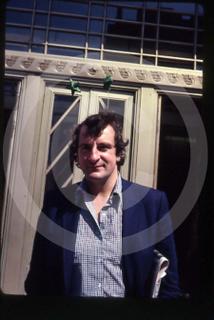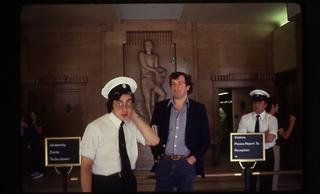
Douglas Adams: The Star of Broadcasting House
12 August 1982. Photo by John May
First publication
You might well ask what Douglas Adams is doing standing outside BBC Broadcasting House in London wearing a pair of deeley boppers on his head. It's my fault.
I was working on assignment for the NME, 'Life, the Universe and Everything' had just been published, and deeley boppers were that summer's craze. I thought it might be fun - and so it turned out to be.
As I recall it, we met in the hotel a few steps from the BBC and settled down in the upstair lounge area. When the waiter came, Douglas ordered a large champagne cocktail. It was around 11am. When he asked me what I was having, I decided it was wise to drink the same. I think we had three each during the interview; it may have been four. Douglas seemed in full control, except he began talking very intensely. I had problems focusing.
Afterwards, spilling out into the afternoon sun, I suggested photos and the deeley boppers and we had a laugh. The photo below was taken inside the lobby of Broadcasting House - illegally. I love the consternation of the security guards and the look on Douglas' face.

Douglas, now sadly deceased, has gone to comedy heaven. 'The Hitch Hikers Guide' and his other works are rightly viewed as classics and his work continues to delight a worldwide audience and new generations.
As far as I can ascertain, the three main biographies are 'Don't Panic' by Neil Gaiman (1988 Titan revised 1993/2002), 'Hitchhiker' by M.J. Simpson (2003. Coronet Books) and 'Wish You Were Here' by Nick Webb (2003. Headline)
Here for the historical record, is an edited version of the NME piece (which they didn't manage to publish until 2nd October 1982).'The Manic Depressive's Guide to Space Travel And How To Be A Successful Writer.
''I suppose I'm a terrible worrier,' says Douglas Adams, 'and by suggesting that underlying everyday events there are appalling explanations, that is my own way of attempting to justify that fact.'Douglas Adams is a carbon-based bipedal life form, well over six foot and burly with it, with what are politely called generous features. He's 30 and looks 40, this creator of Marvin, Zaphod, Ford Prefect, Arthur Dent and the other travelling companions in 'The Hitchhiker's Guide to the Galaxy.' What began as a radio series has now become a media industry in its own right with records, a tv series, three books, several stage shows - and a feature film to come.
[Editor's Note: Worth commenting that the movie did not appear for another 23 years ! Went to the opening night of the stage version at The Rainbow in London, which was a commercial disaster, but it did have the distinction of having Zaphod played by two seperate actors bound up in one costume. Very effective.]
Adams grew up 'feeling at a slight distance to the world' in a house with his grandmother and mother, which acted as a way-station for damaged animals. His mother remarried a vet, so animals, he says, 'form a major part of my consciousness.'This no doubt explains why his book postulates the theory that the earth was created by white mice as an experiment to find the Ultimate Question. A guy involved in behavioural research with mice actually wrote to Adams saying this was a worry and fantasy that he'd often suffered from.
Picture Douglas as a solitary boy with few close friends, a sister with whom he had little in common and a feeling that he was a strange, odd person - a fish out of water. University dispelled this notion and he became 'a thoroughly middle-class graduate and a radio producer.' In between, he worked as a chicken shed cleaner and as a bodyguard for an Arab royal family.
He recalls: 'I remember one group of family members had gone down to the restaurant in the Dorchester. The waiter had brought the menu and they said 'We'll have it.' It took a while for the penny to drop that they actually meant the whole lot, the entire a la carte menu, which was a thousand pounds worth of food. So they brought it, the family tried a little bit of it all and then went back to their room. They then sent one of their servants to bring back a sackful of Wimpys, whichwas what their real obsession was.
'While admitting to liking Dan Dare, Adams is not a science fiction buff. 'Saying I write science fiction is rather like saying the Pythons do historical movies. In a way it's true but it misses the point.
If he was stranded on a distant planet with a Sony Walkman, he'd take the following tapes: 'Magical Mystery Tour', Plastic Ono Band, Ry Cooder, Paul Simon, the new Elvis Costello and 'Requiem' by Gyorgi Ligeti, the monolith music used by Kubrick in '2001'.
Incidentally, the theme music for the radio series was originally by the Eagles, but the tune had to be re-recorded for the tv show (featuring Adams on rhythm guitar) as tv rights could not be obtained. This was due, Adams claims, to the 'impossibility of having any meaningful communication with anybody who lives in California.
'For Adams, The 'Guide' has been a lifesaver. he admits that when he wrote it he felt 'completely washed up and very demoralised.' He was broke, overdrawn, couldn't get work, couldn't pay the rent. The 'Guide' was 'definately an attempt to change perspective. The world at that time was a very alarming place for me. I couldn't handle it.'
Enter Marvin, the eternally depressed android with a brain the size of a planet. You might think he was a dead ringer given Adams' state of mind but it turned out he's based precisely and exactly on Andrew Marshall, one of the writers of the tv series 'End of Part One' and 'Whoops Apocalypse,' who is simply like that. Or was, as Adams' explains.
'Andrew has now left his wife, suddenly decided he's gay and is now living with a man in Milton Keynes and has cheered up a lot. It's curious.' So how does he feel about being immortalised as a robot? 'He tells me he's very annoyed about it but he makes sure that everybody else knows its him.
'People always ask Adams what he's on when he writes that stuff but he insists he writes straight, claiming control is the secret to succesful anarchy. He's a desperate writrer: 'The point at which I really get going is when I've passed the final absolute deadline. I spend a lot of time sitting around worrying.
'Having completed the trilogy of books, he now wants to write another completely different novel before rewriting the three books into one long integrated saga. 'The Once and Future King' by T.H. White was done in a similar way and its a novel he feels very akin to.
On our way out, Douglas almost forgets to pay the bill, stumbles over a man in the lobby, but agrees to pose with stars on his head. Gaucheness mingles with a career obsession. He desperately wanted to be successful and now he is. It doesn't appear to have made him much happier.
Footnote: One of the most famous legends about Douglas is that the idea for the 'Hitchhiker's Guide' came to him while lying drunk in a field in Innsbruck, one starlit night in 1971 - which is what he told me. Not so says M.J. Simpson in an Author's Afterword in his recent biography. According to an interview Simpson did with Adams' old friend Martin Smith after completing the manuscript: 'To Will and I it was first broached just after Douglas returned from Greece in, I am fairly certain, the summer of 1973. He had bought 'A Hitchhiker's Guide to Europe' and, whilst relaxing post-coitally (as he explained it, she was a Dutch girl), looking at the stars from a rock on the north side of Santorini, he thought it would be a pretty neat idea if there were an intergalactic version of the 'Hitchhiker's Guide'!'
1 comment:
I'm usually not a fan of Gehry's work, but this is an exception. Using wood as a wrapper imitating structure is not only novel, but ties the space down through the use of a consistent, inviting, and non-distracting material palette. Perhaps Gehry is more suited to small-scale projects Laptop battery.
Post a Comment